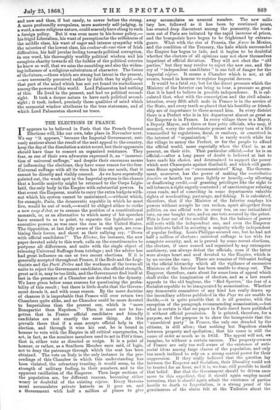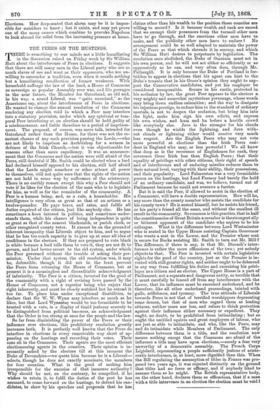THE ELECTIONS IN FRANCE.
Iappears to be believed in Paris that the French General 1 Elections will, like our own, take place in November next. We say "it appears," because the Imperial Government, seri- ously anxious about the result of the next appeal to the country, keep the day of the dissolution a strict secret, lest their opponents should have time to concert an organized resistance. They fear, as one of their own advocates expressed it, an " insurrec- tion of universal suffrage," and despite their enormous means of influencing the elections, they have some reason for the fear. Universal suffrage with all its vices has this one merit, that it cannot be directly and visibly coerced. As we have repeatedly pointed out, the weak spot in the Imperial system is the chance that a hostile majority might be returned to the Corps L4gis- latif, the only body in the Empire with substantial powers. In that event the Emperor, unable to carry the extra budgets with- out which his system cannot be maintained,—without which, for example, Paris, the democratic republic in which he must live, would be out of work,—would be obliged either to strike a new coup dant, or to assume the position of a constitutional monarch, or, as an alternative to which many of his speeches have seemed to us to point, to separate the legislative and executive powers, as was once the case in the United States. The Opposition, at last fully aware of the weak spot, are com- bining their forces, and shout as their rallying cry, "Down with official candidates l" The Elector, for instance, the new paper devoted solely to this work, calls on the constituencies to postpone all differences, and unite with the single object of releasing Universal Suffrage from tutelage ; and the advice has had great influence on one or two recent elections. If it is generally accepted throughout France, if the Reds and the Legi- timists and the Parti Pre'tre and the workmen of the towns all unite to reject the Government candidates, the official strength, great as it is, may be too little, and the Government find itself at last in the presence of a Chamber not devoted to the dynasty. We have given below some reasons for questioning the proba- bility of this result ; but there is little doubt that the Govern- ment dreads it, and with some reason. By the mere doctrine of chances it is improbable that France will ever return two Chambers quite alike, and no Chamber could be more devoted to Imperialism than the present one, which is " more Bonapartist than Napoleon." Then it must not be for- gotten that in France official candidates and friendly candidates are not exactly the same thing. An idea prevails there that if a man accepts official help in the election, and through it wins his seat, he is bound in honour to vote with the Empire in all critical emergencies, to act, in fact, as the nominee members used to act in Pitt's time, that is, either vote as directed or resign. It is a point of honour, or rather, as a Southern Member once said, of logic, not to deny the patronage through which the seat has been obtained. The vote on Italy is the only instance in the pro- ceedings of this Chamber in which this understanding has been violated, the refractory trusting, it would seem, to the strength of military feeling, to their numbers, and to the apparent vacillation of the Emperor. Then large sections of the population are, for different reasons, becoming either weary or doubtful of the existing regime. Every Govern- ment accumulates private hatreds as it goes on, and a Government with half a million of places to give
away accumulates an unusual number. The new tray law, followed as it has been by continued peace, has created deep discontent among the peasantry, the work- men out of Paris are irritated by the rapid increase of prices,
and the bourgeoisie have begun to be frightened by extrava- gance. What with the rise of Prussia, the fiasco in Mexico,
and the condition of the Treasury, the halo which surrounded the Empire has begun to fade, and it begins to be doubtful whether the electors of all opinions may not show themselves
impatient of official dictation. They will not elect the "old parties," but they may resolve to reject the new one, and the cry of "independent candidates " is one full of danger for the Imperial regime. It means a Chamber which is not, at all events, bound in honour to register Imperial decrees.
It would be a fatal cry, but for the direct pressure which the Ministry of the Interior can bring to bear, a pressure so great that it is hard to believe in possible independence. It is cal- culated that, what with the conscription and the civil admin- istration, every fifth adult male in Franco is in the service of
the State, and every tenth so placed that his hostility or friend- ship are of importance to those around him. In every district there is a Prefect who is in his department almost as great as the Emperor is in France. In every village there is a Mayor, a Deputy Mayor, and three or four petty officials, who may, if annoyed, worry the unfortunate peasant at every turn of a life trammelled by regulations, fiscal, or sanitary, or conceived in the interest of "organization." It is rarely worth while for the village to annoy the Prefect, or for the people to offend the official world, more especially when the Curti is, as at present, on their side. That particular official,—for he is an official,—after a long pause of doubt is believed at last to have made his choice, and determined to support the power which sent Chassepots against Garibaldi, and which still garri- sons Rome against an " excommunicated" King. The Govern- ment, moreover, has the power of making the contribution fonca.re or hearth tax press lightly or heavily,—by allowing or disallowing credit,—of granting privileges like the right to sell tobacco, a right eagerly contested ; of sanctioning or refusing cross roads, and of conceding in some departments valuable rights of woodcutting, pasturage, and fishing. It is calculated, therefore, that if the Minister of the Interior employs his powers without scruple he can reckon, apart altogether from politics, on one official vote in every ten, on one intimidated vote, on one bought vote, and on one vote secured by the priest. This is four out of the needful five, but the balance of power still rests with the independent one, and even the Emperor has hitherto failed in securing a majority wholly independent of popular feeling. Louis Philippe secured one, but he had not half a million of electors ; universal suffrage is too wide for complete security, and, as is proved by some recent elections, the electors, if once roused and organized by any extempore machinery, can always defeat the officials, even if the latter were always heart and soul devoted to the Empire, which is by no means the case. There are remains of Orleanist feeling in the official hierarchy which all the vigilance of successive Ministers of the Interior has been unable to stamp out. The Emperor, therefore, casts about for some form of appeal which shall strike the imagination of electors, and as a last resort appeals to the old bugbear, the "Red Spectre," the fear of a Socialist republic to be inaugurated by assassination. Whether any democratic committee of any kind has really drawn up the incendiary address published in the Pays we are unable to decide,—it is quite possible that it is all genuine, with the exception of the paragraph recommending assassination,—but what is certain is that no paper in Paris dared have published it without official permission. It is printed, therefore, for a purpose, and the purpose is to show the bourgeoisie that the "anarchical party" in France, the only one dreaded by the citizens, is still alive ; that nothing but Napoleon stands between property and spoliation ; that his cause is still the cause of order as much as in 1852. The appeal will not, we imagine, be without a certain success. The property-owners of France are only too well aware of the existence of anti- social ideas among large classes of the population, and only too much inclined to rely on a strong central power for their suppression. If they really believed that the question lay between the Emperor and Socialism, their liberality could not be trusted for an hour, and it is, we fear, still possible to instil that belief. But that the Government should be driven once more to this expedient, that it should again employ moral terrorism, that it should again admit the existence of parties hostile to death to Imperialism, is a strong proof of the genuineness of the alarm felt at the Tuileries about the Elections. How deep-seated that alarm may be it is impos- sible for outsiders to know ; but it exists, and may yet prove one of the many causes which combine to provoke Napoleon to look abroad for relief from the increasing pressure at home.































 Previous page
Previous page